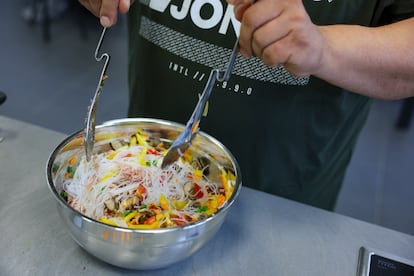Diets in September: Why you should avoid shortcuts and opt for sustainable changes

Strictly opinion pieces that reflect the author's unique style. These opinion pieces must be based on verified data and be respectful of individuals, even if their actions are criticized. All opinion pieces by individuals outside the EL PAÍS editorial team will include, after the last line, a byline—no matter how well-known the author may be—indicating their position, title, political affiliation (if applicable), or main occupation, or any that is or was related to the topic addressed.

September arrives with the excitement of a new school year and new beginnings. But it also brings a heavy burden about what we should have achieved after the promises made on the night of December 31, 2024, but which we haven't achieved.
We've gone from having a relaxed diet, where eating ice cream is fine on August 31st, but after September 1st, it's a complete nonsense and a lack of responsibility for your health. September arrives with a rush and urgency, as if it were a global tune-up that showcases your willpower and your capacity for sacrifice. Thanks to social media, resolutions are now not individual, but collective. It's very easy to get caught up in all the demands of someone else's start to the school year, added to your own.
This month, post-vacation challenges, glow-ups , express diets, detoxes , and fasting are making a comeback—because they never left.
I want to warn you that so-called "miracle diets" are at their peak: those that propose significant weight loss in a short period of time. These diets are characterized by eliminating a large group of foods, without nutritional supervision or review, and are not without risks. There are some groups of diets, in particular, that are especially dangerous for the rapid weight loss trap.
- Very Low Calorie Diet (VLCD): those diets that, just by looking at them, you know you're going to be ravenously hungry, diets with an intake of less than 800 kcal. These diets are very dangerous and completely contraindicated.
- Monodiets: These are diets that use a single food as the basis of the diet, such as the famous "artichoke diet" or "pineapple diet." They typically allude to a property of the food, in both cases its diuretic nature, and suggest its consumption at every meal. These are very low-calorie diets, causing nutritional deficiencies and a deep hatred of the food in question.
- Detox or cleansing: those smoothie-based diets that promise a break for your body from all those "toxins" we eat . They claim to slow down and give your body a rest, as if it doesn't naturally tend toward homeostasis or have its own cleansing mechanisms. These diets are very expensive because they sell smoothies made from fruits and vegetables—the more exotic, the better—and suggest replacing meals with them. They're not just expensive financially, but also for your health. They cause a loss of muscle mass, which weakens your metabolism. They can also cause dizziness, low blood pressure, and nutritional deficiencies.
- Fasting or intermittent fasting: Fasting as such is not a diet, but a nutritional strategy. Fasting is presented as a poetic way to redeem the sins of summer gluttony. Fasting doesn't seem restrictive, because it doesn't eliminate or prohibit foods like other diets, but it is a very severe time restriction . It proposes periods of 8, 12, or 16 hours during which you can only consume water, coffee, or infusions—that is, only low-calorie beverages. So it is a restriction, and you should prioritize the consumption of healthy foods when eating. If you have an eating disorder or a poor relationship with food, it's the worst thing you can do, as it will exacerbate unhealthy behaviors.
According to a study conducted by MAPFRE and the Spanish Academy of Nutrition and Dietetics among 3,150 adults, 7 out of 10 Spaniards have tried one of these diets as a weight-loss strategy. Fifty-three percent of those surveyed have tried one of these diets, and 70% of them without any professional supervision. Women try to lose weight twice as often as men, and we mustn't forget that we are under greater aesthetic pressure. The loss is estimated at about 6 kilos quickly, which, when they abandon the diet, they regain with the famous rebound effect .
In general, these diets will cause you to lose weight at the expense of your muscle mass, not fat. By causing a sudden drop in calories, the body turns to muscle glycogen as an energy source. Each gram of glycogen stores about three grams of water, so you'll lose primarily water. You'll see this drop on the scale, but your body composition will worsen.
Low intake induces muscle catabolism: with little energy available, the body will use amino acids from muscle mass as a substrate. Glucose is produced through the process of gluconeogenesis, since the brain, liver, and other organs need it to function. The body is designed to survive, so if you don't provide it with enough energy, it will look for ways to obtain it. The body understands that this restriction is not voluntary, but rather a situation of energy scarcity. In response, it decreases the metabolic rate and increases the efficiency of fat storage. This explains the rebound effect : weight is regained, but with a loss of muscle mass and an increase in fat. Therefore, this type of diet does your body a disservice.
All of these diets worsen your relationship with food. They not only cause physical harm, but also psychological damage. You'll end up with a fear of food, anxiety, and a lack of knowledge of what to eat. In the worst cases, they can trigger an eating disorder.
Therefore, I recommend you leave aside shortcuts and take care of your body respectfully, without rushing, and doing what doesn't cause greater long-term harm. Health isn't rushed, it's nurtured.

Clinical nutritionist, founder of the online clinic "Se come como se vive." She holds a degree in nutrition (UCM), a master's degree in eating disorders (UEM), and specializes in vegetarian and vegan nutrition (INCS).
EL PAÍS




